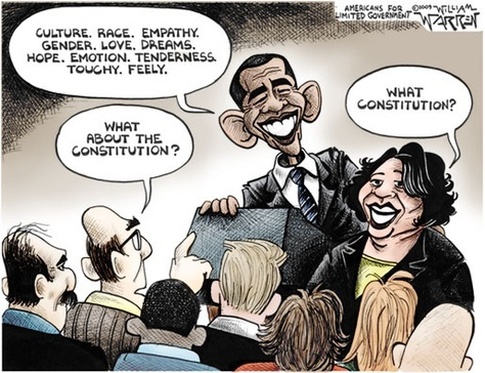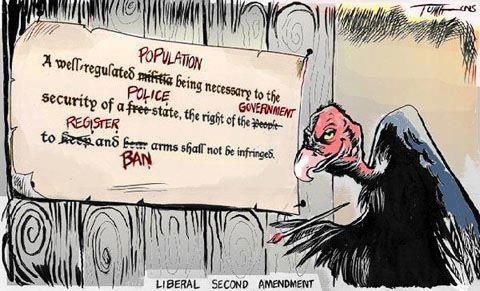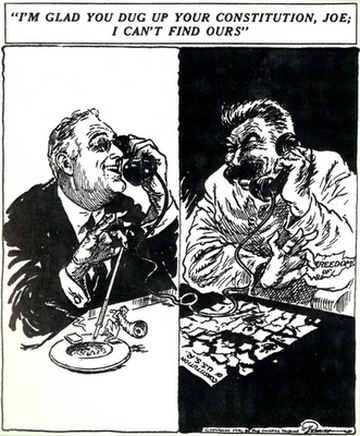The Progressive Bill of Rights
Years after having initially written this, I still stand by it even though I no longer self-identify as conservative or libertarian. There are things about progressivism that I like, and obviously many things that I don't.
"The Left should just give up on the Constitution. That's what they did when they had to start pretending it was a 'living, breathing document'. That was an admission of defeat. If the Constitution said what the Left wanted it to say, they would be insisting on its strict interpretation. The fact that leftists instead spend their time assuring us that its meaning has evolved, that we can’t live in the past, that the Constitution has to get with the times, proves that they realize the original text is not compatible with their various schemes." - Thomas Woods, historian and political analyst
"It's not an endlessly expanding list of rights - the 'right' to education, the 'right' to health care, the 'right' to food and housing. That's not freedom, that's dependency. Those aren't rights, those are the rations of slavery - hay and a barn for human cattle." - P. J. O'Rourke, journalist and author
"It's not an endlessly expanding list of rights - the 'right' to education, the 'right' to health care, the 'right' to food and housing. That's not freedom, that's dependency. Those aren't rights, those are the rations of slavery - hay and a barn for human cattle." - P. J. O'Rourke, journalist and author
1. Congress shall make no law respecting an establishment of religion, except to prohibit the free exercise thereof in or near a place of public gathering where non-believers may take offence, or to force its practitioners to provide free birth control for others; and likewise no establishment of religion may have voice in any processes pertaining to the governance of the States; or abridging the freedom of speech except where fellow citizens may take offence, or of the press to distribute falsehoods in the name of ideology; or the right of the people peaceably to assemble, and to petition the Government for a redress of grievances, but if such petition is contrary to the greater good the Government shall pay it no heed.
2. A well regulated Militia, being necessary to the security of a free State, the right of the people to keep and bear Arms, shall nonetheless be explicitly denied them. Or:
2. A well regulated Militia, being necessary to the security of a free State, the right of the people to keep and bear Arms, shall nonetheless be explicitly denied them. Or:
3. No Soldier shall be sent to conduct War against other men, until an attack has first been made upon these United States or their territories, and then the War must be fully conducted within one month’s time; or when declared by the Secretary of State, in a manner proscribed by law.
4. The right of the people to be secure in their persons, houses, papers, and effects, against unreasonable searches and seizures, shall not be violated, and no Warrants shall issue, but upon the President's order.
5. No person shall be held to answer for a capital, or otherwise infamous crime, under any circumstances whatsoever; nor shall any person be subject for any offense to be put in jeopardy of life or limb; nor shall be compelled in any criminal case to be a witness against himself, nor be deprived of life, liberty, or property, without approval of the President; nor shall private property be taken for any other than governmental or public use, without proper documentation.
6. In all criminal prosecutions, the accused shall enjoy the right to a speedy and public trial, by an impartial jury of the State and district wherein the crime shall have been committed, which district shall have been previously ascertained by law, and to be informed of the nature and cause of the accusation; to be confronted with the witnesses against him; to have compulsory process for obtaining witnesses in his favor, and to have the Assistance of Counsel for his defence - unless he is white and accused of inflicting bodily harm on a colored person.
7. In Suits at common law, where any value shall be in controversy, the right of trial by jury shall be preserved, and any fact tried by a jury, may be otherwise re-examined in any Court of the United States, until a ruling satisfactory to the judges involved has been reached.
8. Bail shall not be required, fines imposed, nor punishments of any sort inflicted; rather any and all Criminals shall remain entitled to the same dignity and privileges as any Citizen of these States.
9. The enumeration in the Constitution, of certain rights, shall only be construed to deny or disparage others retained by the people in the name of the greater good, except for the right of Women to slay their unwanted children before birth, with funds to be appropriated by Congress from amongst the taxes of the people, which shall be infringed upon under no circumstances.
10. The powers not delegated to the United States by the Constitution, nor prohibited by it to the States, are reserved to the President and to Congress, respectively, and shall not be infringed upon by the courts.
4. The right of the people to be secure in their persons, houses, papers, and effects, against unreasonable searches and seizures, shall not be violated, and no Warrants shall issue, but upon the President's order.
5. No person shall be held to answer for a capital, or otherwise infamous crime, under any circumstances whatsoever; nor shall any person be subject for any offense to be put in jeopardy of life or limb; nor shall be compelled in any criminal case to be a witness against himself, nor be deprived of life, liberty, or property, without approval of the President; nor shall private property be taken for any other than governmental or public use, without proper documentation.
6. In all criminal prosecutions, the accused shall enjoy the right to a speedy and public trial, by an impartial jury of the State and district wherein the crime shall have been committed, which district shall have been previously ascertained by law, and to be informed of the nature and cause of the accusation; to be confronted with the witnesses against him; to have compulsory process for obtaining witnesses in his favor, and to have the Assistance of Counsel for his defence - unless he is white and accused of inflicting bodily harm on a colored person.
7. In Suits at common law, where any value shall be in controversy, the right of trial by jury shall be preserved, and any fact tried by a jury, may be otherwise re-examined in any Court of the United States, until a ruling satisfactory to the judges involved has been reached.
8. Bail shall not be required, fines imposed, nor punishments of any sort inflicted; rather any and all Criminals shall remain entitled to the same dignity and privileges as any Citizen of these States.
9. The enumeration in the Constitution, of certain rights, shall only be construed to deny or disparage others retained by the people in the name of the greater good, except for the right of Women to slay their unwanted children before birth, with funds to be appropriated by Congress from amongst the taxes of the people, which shall be infringed upon under no circumstances.
10. The powers not delegated to the United States by the Constitution, nor prohibited by it to the States, are reserved to the President and to Congress, respectively, and shall not be infringed upon by the courts.
Truth is Stupider than Fiction
Franklin Roosevelt, everyone's favorite president, author of the 1939 New York Times bestseller How to Finish Off a Crippled Economy and Take the Credit for Saving it, and a personal friend of "Uncle Joe" Stalin (to whom he once delivered a million anti-Communist Russian POWs that had been promised asylum - what, didn't you learn that in Social Studies?), created his own Economic Bill of Rights to be added to the original and announced it in his State of the Union address on January 11, 1944. He declared (with brackets around the parts of his speech that were cut from the transcript):
"It is our duty now to begin to lay the plans and determine the strategy for the winning of a lasting peace and the establishment of an American standard of living higher than ever before known. We cannot be content, no matter how high that general standard of living may be, if some fraction of our people - whether it be one-third or one-fifth or one-tenth - is ill-fed, ill-clothed, ill-housed, and insecure. [Please, nobody mention my Japanese-American concentration, er, internment camps.]
This Republic had its beginning, and grew to its present strength, under the protection of certain inalienable political rights - among them the right of free speech, free press, free worship, trial by jury, freedom from unreasonable searches and seizures. [See, I did remember something from high school.] They [were] our rights to life and liberty. [Oops, slip of the tongue, I meant they are our rights to life and liberty. Heh heh, that was close.] As our nation has grown in size and stature, however—as our industrial economy expanded—these political rights proved inadequate to assure us equality in the pursuit of happiness.
We have come to a clear realization of the fact that true individual freedom cannot exist without economic security and independence. [And economic security and independence cannot exist without government regulation of every aspect of the economy.] 'Necessitous men are not free men.' People who are hungry and out of a job are the stuff of which dictatorships are made. [Seriously, I should know.]
In our day these economic truths have become accepted as self-evident. [I know; I took a survey of my whole Cabinet.] We have accepted, so to speak, a second Bill of Rights under which a new basis of security and prosperity can be established for all—regardless of station, race, or creed. [Well, except for Japanese, but no one cares about them.] Among these are:
The right to a useful and remunerative job in the industries or shops or farms or mines of the nation;
The right to earn enough to provide adequate food and clothing and recreation;
The right of every farmer to raise and sell his products at a return which will give him and his family a decent living;
The right of every businessman, large and small, to trade in an atmosphere of freedom from unfair competition and domination by monopolies at home or abroad;
The right of every family to a decent home;
The right to adequate medical care and the opportunity to achieve and enjoy good health;
The right to adequate protection from the economic fears of old age, sickness, accident, and unemployment;
The right to a good education.
All of these rights spell security. And after this war is won we must be prepared to move forward, in the implementation of these rights, to new goals of human happiness and well-being. America's own rightful place in the world depends in large part upon how fully these and similar rights have been carried into practice for all our citizens. For unless there is security here at home there cannot be lasting peace in the world."
This is real. I'm not making it up (okay, except for the parts in brackets. You caught me). It seems that in addition to polio, poor Franklin suffered from a rare mental disorder that plagued him throughout his presidency and especially during the writing of this speech. For reasons unknown it continues to plague certain politicians. Like them, he obviously believed he was God.
"It is our duty now to begin to lay the plans and determine the strategy for the winning of a lasting peace and the establishment of an American standard of living higher than ever before known. We cannot be content, no matter how high that general standard of living may be, if some fraction of our people - whether it be one-third or one-fifth or one-tenth - is ill-fed, ill-clothed, ill-housed, and insecure. [Please, nobody mention my Japanese-American concentration, er, internment camps.]
This Republic had its beginning, and grew to its present strength, under the protection of certain inalienable political rights - among them the right of free speech, free press, free worship, trial by jury, freedom from unreasonable searches and seizures. [See, I did remember something from high school.] They [were] our rights to life and liberty. [Oops, slip of the tongue, I meant they are our rights to life and liberty. Heh heh, that was close.] As our nation has grown in size and stature, however—as our industrial economy expanded—these political rights proved inadequate to assure us equality in the pursuit of happiness.
We have come to a clear realization of the fact that true individual freedom cannot exist without economic security and independence. [And economic security and independence cannot exist without government regulation of every aspect of the economy.] 'Necessitous men are not free men.' People who are hungry and out of a job are the stuff of which dictatorships are made. [Seriously, I should know.]
In our day these economic truths have become accepted as self-evident. [I know; I took a survey of my whole Cabinet.] We have accepted, so to speak, a second Bill of Rights under which a new basis of security and prosperity can be established for all—regardless of station, race, or creed. [Well, except for Japanese, but no one cares about them.] Among these are:
The right to a useful and remunerative job in the industries or shops or farms or mines of the nation;
The right to earn enough to provide adequate food and clothing and recreation;
The right of every farmer to raise and sell his products at a return which will give him and his family a decent living;
The right of every businessman, large and small, to trade in an atmosphere of freedom from unfair competition and domination by monopolies at home or abroad;
The right of every family to a decent home;
The right to adequate medical care and the opportunity to achieve and enjoy good health;
The right to adequate protection from the economic fears of old age, sickness, accident, and unemployment;
The right to a good education.
All of these rights spell security. And after this war is won we must be prepared to move forward, in the implementation of these rights, to new goals of human happiness and well-being. America's own rightful place in the world depends in large part upon how fully these and similar rights have been carried into practice for all our citizens. For unless there is security here at home there cannot be lasting peace in the world."
This is real. I'm not making it up (okay, except for the parts in brackets. You caught me). It seems that in addition to polio, poor Franklin suffered from a rare mental disorder that plagued him throughout his presidency and especially during the writing of this speech. For reasons unknown it continues to plague certain politicians. Like them, he obviously believed he was God.



